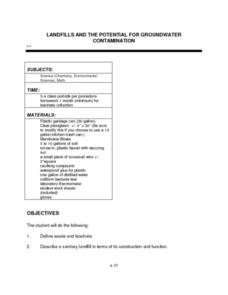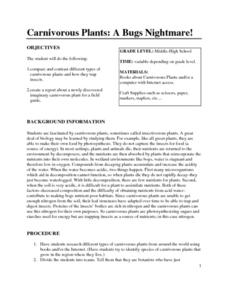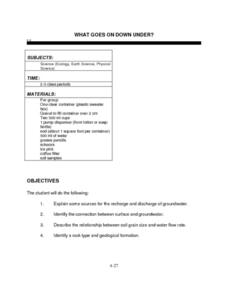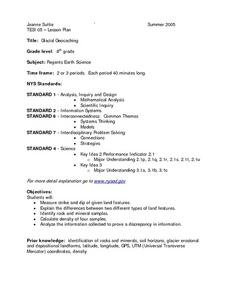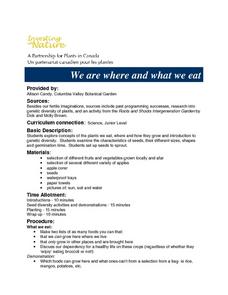Curated OER
Mountain Building
Fourth graders identify variables that influence rates of change. They, through group consensus and using the assigned materials, design and build what they believe to be the strongest mountain possible.
Curated OER
Water Quality
Young scholars conduct experiments to study the quality of water. They examine how pollutants get into and affect the water supply in this unit.
Curated OER
Landfills and the Potential for Groundwater Contamination
Students examine how a sanitary landfill is constructed, how it functions, and how waste and leachate affects the areas around the landfill. After a discussion about landfills and leachates, students construct a Sanitary Landfill Model...
Curated OER
Outdoor Education
Students participate in various outdoor activities to teach them about the environment. In this outdoor education lesson plan, students participate in activities such as compass direction, conservation, forestry, wildlife, and...
Curated OER
Investigation 2 - Greenhouses
Third graders set up a miniature greenhouse to help them explain how nonliving things affect the growth of living things.
Curated OER
Exploring For Copper Deposits
Students examine ore deposits and identify factors in their origin. They analyze geologic maps, and locate porphyry copper deposits on a sediment geochemistry map.
Curated OER
The Western Migration Lesson Plan: Socratic Seminar
High schoolers participate in a Socratic Seminar and explore Western Migration.
Curated OER
The Principles Of Composting
Students put items in a plastic bag and watch the effects of composting. While completing the experiment, students answer questions and ask permission to start their own compost pile at home.
Curated OER
Bean and Ozone Project
Students performed an experiment in which they grew beans in an ozone chamber and some in regular air in order to see if the ozone causes damage to the plants.
Curated OER
Archaeobotany
Students study pictures of seeds and the conditions in which they grow during their study of archaeobotany. They infer ancient plant use by looking at archaeobotanical samples. They determine the change of plant use by interpreting a...
Curated OER
Does the Seed Matter?
Students compare the growth of watermelon from commercial seeds and those harvested from a watermelon. They complete science journals showing these comparisons based on the data they collect.
Curated OER
Carnivorous Plants: A Bugs Nightmare!
Young scholars research carnivorous plants and how they trap insects. They role play as botanists to write a research field guide about a newly discovered imaginary carnivorous plant.
Curated OER
Little Bloomers: Gardening With Trees
Students identify the parts of tree flowers. They examine the role they have in pollination. They discuss trees that do not flower as well.
Curated OER
What Goes On Down Under?
Students explore the sources for recharge and discharge of groundwater. They research the connection between surface water and groundwater. Students construct a model of an aquifer and explore recharge and discharge of the aquifer.
Curated OER
Glacial Geocaching
Eighth graders measure strike and dip of given land features and explain the difference between them. They also look at rock and mineral samples for indentification, along with calculating the density. Finally, information is analyzed...
Curated OER
Life in a Cup
Third graders make and maintain a mini terrarium. They keep a daily journal of what happens in their terrarium and record daily observations and measurements.
Curated OER
Cotton and Cabbage
High schoolers note how given traits could be achieved by selective breeding and by transgenesis. They identify different uses of GEO. Students recognize that the use of letters (Bt) before an organism's name means that the organism has...
Curated OER
We are where and what we eat
Students explore concepts of plants they eat, where and how they grow and are introduced to genetic diversity. They examine seed characteristics, look at their different sizes, shapes and germination time. They also set up seeds to...
Curated OER
Habitat Unit - Day 2
Students explore abiotic factors that affect habitats. After a class lecture, students work in groups to answer questions about plant tissue, production and growth. They share answers, complete a crossword puzzle, and create a habitat...
Curated OER
Ecosystem Organization - Lesson Plan
Student explore ecosystems. In this ecosystem organization lesson, pupils consider how scientists study living organisms. Students participate in a teacher guided activity that requires them to visualize an organism and imagine its place...
Curated OER
Would You Drink This?
Students examine how they affect water quality of those who live downstream after identifying rivers and river basins in Kansas.
Curated OER
What's Gotten Into You?
Students use models to investigate the process and consequences of water contamination on the land, groundwater, and plants.
Curated OER
Scientific Investigation- Magnets
Students conduct a scientific investigation to determine if a magnet attracts paper clips through different materials. Students write out their procedures, collect data and present it in a table or chart, and analyze their results.
Other popular searches
- Types of Soil
- Types of Soil Powerpoint
- Different Types of Soil
- Types of Soil Decomposers
- Three Types of Soil
- Classify Soil Types
- Biomes and Soil Types
- Geography Soil Types
- Types of Soil Decompose Rs
- Soil Types Worksheet
- Australian Soil Types
- Bio Mes and Soil Types




